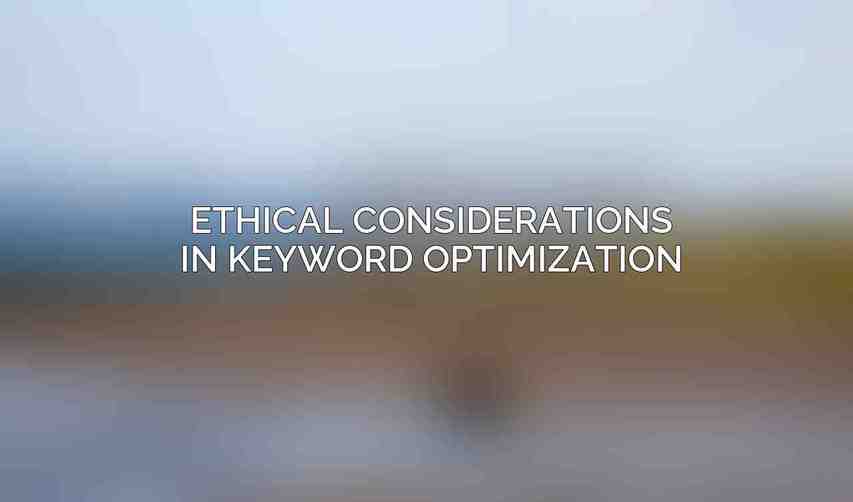seo keyword optimization plays a crucial role in determining the success of online content. by understanding and implementing effective keyword strategies, content creators can significantly enhance their visibility and reach across search engines. Keyword Optimization involves the strategic use of specific words or phrases within digital content to ensure it ranks well in search engine results.
The importance of keyword optimization for digital content cannot be overstated. It serves as the foundation for search engine optimization (SEO), powering the discovery of content by users actively seeking information. When done correctly, keyword optimization can drive organic traffic to websites, increase conversion rates, and boost overall online visibility.
One of the key benefits of effective keyword optimization is the ability to connect with target audiences seamlessly. By aligning content with relevant keywords, businesses can attract users who are genuinely interested in their products or services, leading to higher engagement and potential conversions.
Keyword Research and Selection

A. Identifying Relevant Keywords
The first step in keyword optimization is identifying relevant keywords that resonate with the target audience. This process involves researching industry-specific terms, understanding user search behavior, and analyzing competitor keywords to determine what terms are most valuable.
B. Keyword Analysis Tools and Techniques
Such as google keyword planner, Semrush, and Ahrefs. These tools provide valuable insights into search volume, competition levels, and potential keyword variations, helping content creators make informed decisions.
C. Targeting Long-Tail Keywords
In addition to focusing on broad keywords, incorporating long-tail keywords can be highly effective in capturing specific search queries with lower competition. Long-tail keywords often yield higher conversion rates as they cater to users with precise search intents.
D. Analyzing Search Intent
Understanding user search intent is essential for selecting the right keywords. By analyzing whether users are looking for information, products, or services, content creators can tailor their content to meet these specific needs effectively.
On-Page Optimization
A. Keyword Placement in Title Tags and Meta Descriptions
Optimizing title tags and meta descriptions with relevant keywords is crucial for signaling to search engines and users what the content is about. Well-crafted titles and descriptions can improve click-through rates and overall visibility.
B. Including Keywords in Header Tags (H1, H2, etc.)
Header tags are essential for structuring content and indicating hierarchy. Including keywords in header tags not only improves readability but also signals the relevance of the content to search engines.
C. Optimizing Content for Readability and Relevance
Creating high-quality content that is optimized for readability and relevance is key to engaging users and satisfying search engine algorithms. Balancing keyword usage with natural language is vital for maintaining authenticity and value.
D. Internal Linking for Keyword Distribution
Internal linking strategically within content can help distribute keyword authority across various pages of a website. By linking relevant pages using anchor text with keywords, content creators can enhance the overall SEO value of their website.
E. Image Optimization with Alt Tags
Image optimization is often overlooked in keyword optimization strategies. Adding Alt tags with relevant keywords to images not only improves accessibility for visually impaired users but also provides search engines with additional context about the content. Check this blog on SEO Basics 2024: A Beginner’s Guide to Search Engine Optimization
Off-Page Optimization
A. Link Building for Credibility and Authority
Link building remains a critical off-page optimization strategy for establishing credibility and authority. Acquiring backlinks from reputable websites with relevant anchor text can significantly boost a website’s SEO performance.
B. Social Media Engagement and Keyword Presence
Maintaining an active presence on social media platforms can contribute to keyword optimization efforts. Sharing content with optimized keywords and engaging with users can increase visibility and drive traffic back to the website.
C. Guest Posting and Content Syndication
Guest posting on industry-relevant websites and participating in content syndication can broaden the reach of content. By including targeted keywords in guest posts and syndicated content, businesses can attract new audiences and build backlinks.
Technical Optimization
A. Page Speed and Mobile Optimization
Optimizing page speed and ensuring mobile responsiveness are crucial technical aspects of SEO. Search engines prioritize user experience, so websites that load quickly and function well on mobile devices are more likely to rank higher in search results.
B. Structured Data Markup for Enhanced Search Results
Implementing structured data markup using schema.org can help search engines better understand the content on a website. This can lead to enhanced search results with rich snippets, improving visibility and click-through rates.
C. XML Sitemaps for Improved Indexing
Creating XML sitemaps allows search engines to crawl and index website pages more efficiently. By providing a roadmap of the site’s structure and content, XML sitemaps facilitate better indexation and increase the chances of content being discovered.
Keyword Tracking and Analysis
A. Google Search Console for Keyword Performance Insights
Google Search Console provides valuable insights into how a website performs in search results. Monitoring keyword performance, impressions, and click-through rates can help content creators refine their keyword strategies for better SEO outcomes.
B. Analytics Tools for Conversion Tracking
Using analytics tools such as Google Analytics enables businesses to track conversions resulting from specific keywords. By analyzing which keywords drive the most conversions, marketers can optimize their content for better ROI.
C. Regular Keyword Monitoring and Adjustment
Regular keyword monitoring is essential for staying competitive in the digital world. Search trends, user behavior, and algorithm updates can influence keyword performance, necessitating ongoing adjustments to maintain SEO effectiveness.
Advanced Keyword Optimization Strategies
A. Latent Semantic Indexing (LSI) for Semantic Search
Latent Semantic Indexing (LSI) involves analyzing the relationships between words to understand the context of content better. By incorporating semantically related keywords, content creators can enhance content relevance and improve SEO performance.
B. Natural Language Processing (NLP) for Contextual Understanding
Natural Language Processing (NLP) technologies enable search engines to interpret human language more accurately. By structuring content around conversational phrases and natural language patterns, businesses can optimize for voice search and semantic understanding.
C. Voice Search Optimization
With the rising popularity of voice search, optimizing content for voice queries is becoming increasingly important. Tailoring keywords to match how users speak naturally can help websites rank better in voice search results and meet the evolving needs of users.
Ethical Considerations in Keyword Optimization

A. Avoiding Keyword Stuffing and Black Hat Techniques
Keyword stuffing and other black hat SEO techniques can harm a website’s credibility and reputation with search engines. Instead, focusing on creating high-quality, user-centric content that naturally incorporates keywords is key to ethical keyword optimization.
B. Prioritizing User Experience over Search Engine Rankings
While SEO is essential, prioritizing user experience over search engine rankings is crucial. By delivering valuable and engaging content that meets user needs, businesses can build trust with audiences and improve long-term SEO performance.
continuous keyword optimization is a fundamental aspect of successful digital marketing strategies. By implementing best practices for effective keyword optimization, businesses can enhance their online presence, attract valuable traffic, and achieve meaningful results. As search algorithms evolve and user behaviors change, staying agile in keyword optimization is vital for maintaining competitiveness and relevance in the digital world.
Frequently Asked Questions
What is SEO keyword optimization?
SEO keyword optimization is the process of researching, analyzing, and selecting the best keywords to target in order to drive targeted traffic to your website through organic search results.
How important are keywords in SEO?
Keywords are essential in SEO as they help search engines understand the content of a webpage and match it with relevant search queries. Proper keyword optimization can significantly improve a website’s visibility in search results.
What are some effective strategies for keyword optimization?
Some effective keyword optimization strategies include conducting thorough keyword research, identifying long-tail keywords, using keywords in strategic locations such as page titles and meta descriptions, and monitoring keyword performance to make necessary adjustments.
Should I use exact match keywords or long-tail keywords for optimization?
While exact match keywords can be beneficial for targeting specific search queries, long-tail keywords often have less competition and can drive more targeted traffic to your website. It’s recommended to use a mix of both types of keywords for a well-rounded optimization strategy.
How can I measure the success of my SEO keyword optimization efforts?
You can measure the success of your SEO keyword optimization efforts by tracking key performance indicators such as organic search traffic, keyword rankings, click-through rates, and conversions. Analyzing these metrics can help you evaluate the effectiveness of your keyword optimization strategies and make informed decisions for improvement.

